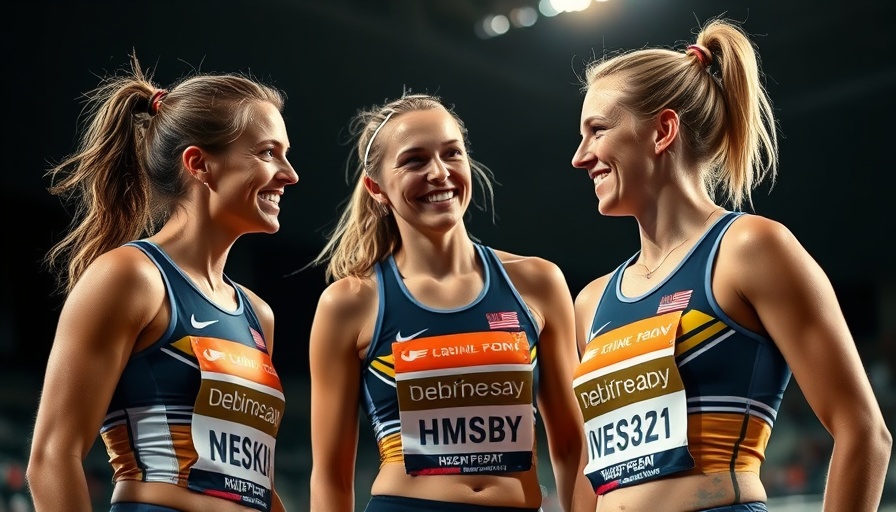
World Championships in Tokyo: A Deep Dive
The first day of the World Championships in Tokyo has set the stage for intriguing discussions on the dynamics of international competition, team strategy, and national pride in athletics. Following the morning and evening sessions, with attention especially drawn to the mixed 4x4 heats and finals, it's clear there are multiple layers to unpack from the events we've witnessed.
In 'Unfortunately, We Should have seen ALL this Coming?! || A Way TOO HONEST Day 1 Tokyo RECAP', the discussion dives into the complexities of athletic recognition and national pride, exploring key insights that sparked deeper analysis on our end.
Acknowledging the Stars
Among the standout performances, Beatrice Chebet secured a gold in the women’s 10K, confirming the expectations of many who have closely followed her trajectory. This victory wasn't merely about winning; it was a celebration of her incredible dominance throughout the season, showcasing that she's a name worth remembering in the years ahead.
Conversely, Ryan Crowder's journey is equally noteworthy. His gold in shot put was backed by a season marked by struggles, making his achievement even sweeter. The narrative of resilience speaks volumes about athletes who defy expectations and overcome adversities, and this is an important lesson in sportsmanship for young athletes.
Team USA in the Mixed Relay: The JV Team?
In a sharp critique of Team USA's approach to the mixed relay, the notion of sending "JV" athletes—those who didn’t qualify for the individual events—prompts a larger conversation. While these athletes possess talent, there's a stark contrast compared to countries like the Netherlands, who field their best competitors. This dichotomy is not just about strategy but speaks to a wider understanding of how these events are perceived domestically versus internationally.
The mixed relay may seem like a secondary event, but winning it holds a vital significance in elevating national pride. When Team USA clinched the gold, one would expect heightened recognition, yet, as noted, this achievement might not resonate as powerfully in mainstream media—reflecting a broader misunderstanding of the sport within American culture.
The Role of National Identity in Track and Field
The pride felt by athletes representing their nations is palpable, particularly in countries like the Netherlands, where track and field stars are celebrated as national icons. Watching Fim Kabal, known for her impressive anchor leg, demonstrates the emotional high stakes during these relays—where each performance can unite a nation behind their athletes. In the U.S., however, the narrative changes. Track and field often plays second fiddle to more commercially viable sports.
When we consider how victories are celebrated, the contrast is stark. In America, individual athletes gain fame, but the collective identity often fades. This disparity in national pride affects how emerging athletes, like those on the mixed relay team, get recognition or sponsorship post-competition, leaving many to face harsh financial realities despite their achievements.
Understanding Athlete Recognition: More Than Just Medals
Ryan Crowder's shot put accomplishment, while highly commendable, might not receive the recognition it deserves in light of American sports culture that tends to gravitate toward sprint athletes. The invisibility of throw events is an issue that needs addressing—how can we celebrate and promote every discipline in athletics? This dilemma highlights the importance of broadening our sports viewership to appreciate various athletic achievements.
Furthermore, the mixed relay's win should be amplified. It isn’t just another gold; it signifies the growth and potential of Team USA's young talents. Yet the question lingers: how do we elevate this unseen heroism to a more notable position within the sports community?
Looking Forward: Future Competitions and Their Impacts
As we anticipate the finals for the men’s and women’s hundred meters, the stakes are high and excitement palpable. However, it's crucial to ask who stands to gain the most from these victories. Not only will individual athletes strive for gold, but so will their sponsors and sports brands—a reminder of the commercial pressures surrounding these athletes.
This isn't just about medals; it's a pivotal moment highlighting how the business of athletics intertwines with national identity. Moving forward, recognizing achievements in all formats, from individual competitions to team relays, will be essential in fostering a more inclusive sports culture.
In conclusion, the first day of the Tokyo World Championships has opened a dialogue on the complexities of athletic recognition and national pride. As we move through these competitions, let’s engage in a thorough discourse, ensuring each athlete receives their due acknowledgment, reflecting the true essence of sportsmanship and achievement across the board.
If you’re passionate about the nuances of athletics and want to stay informed on track and field events, subscribe and engage with us! Let’s ensure every athlete’s story is told.
 Add Row
Add Row  Add
Add 




Write A Comment